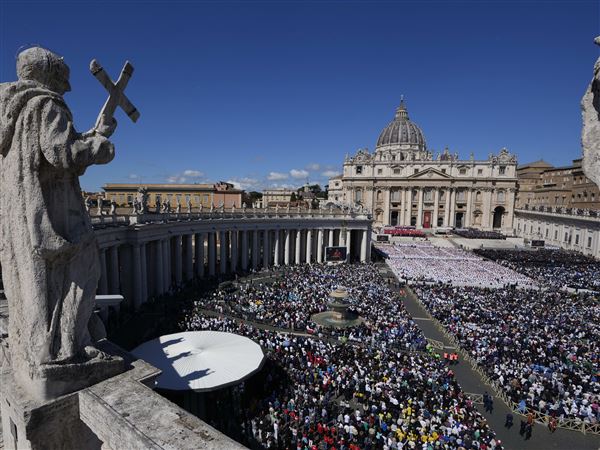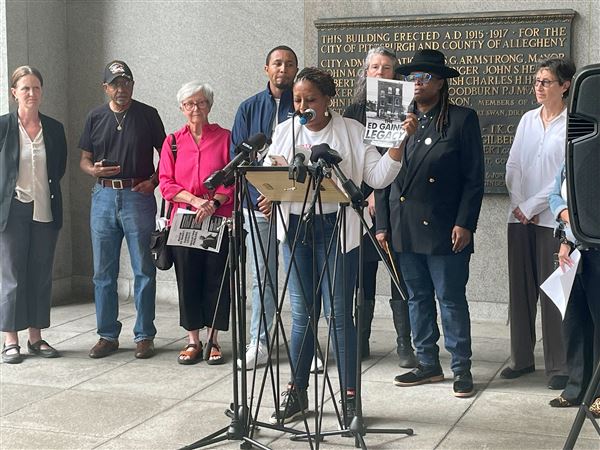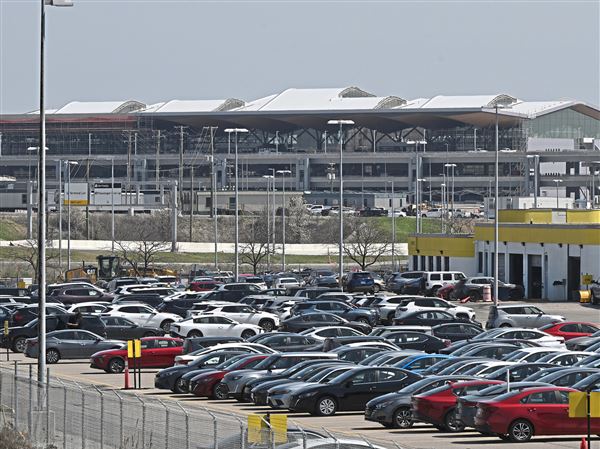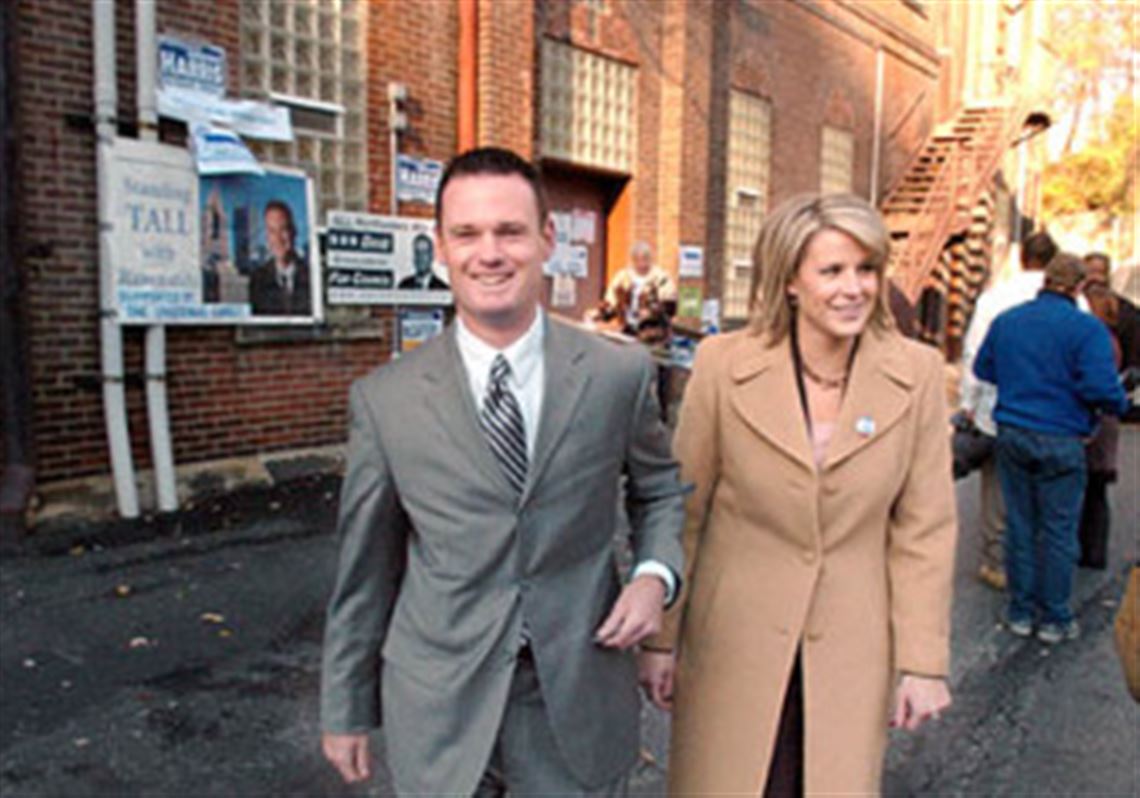First elevated by a tragedy, Luke Ravenstahl triumphed in his bid for two more years as Pittsburgh mayor yesterday, easily turning back a vigorous Republican run at the post and emerging from a bruising campaign without political scars.
Republican challenger Mark DeSantis' determined campaign and healthy bankroll, plus perceived missteps by the 27-year-old Democrat he sought to unseat, earned him the best GOP showing in a mayor's race since 1965. But that was far from enough.
Unofficial results showed Mr. Ravenstahl winning by 63 percent to 35 percent.
"Thank you Pittsburgh!" he shouted to a crowd of fans at the Westin Convention Center Hotel. Responding to someone in the crowd, he said, "I love you, too."
"Over the past 14 months that I've had the opportunity to serve as mayor, I've learned a great deal," he said in a six-minute speech, flanked by family. "We've made some mistakes, and we've faced some serious challenges. But we always learn and continue to get better."
Mr. DeSantis, 48, of Downtown, visited 14 polling places after running a quarter-million-dollar operation that included the campaign's only television ads. He conceded defeat at 10 p.m.
He said he was "doggone excited and proud" of the result.
"You've helped reinvigorate the political process in this city," he told supporters at the Bossa Nova nightclub Downtown.
"You wanted the leaders of our city to stop ignoring and endlessly talking about our problems and finally get down to the business of solving them," he said. "We changed Pittsburgh for the better, forever."
Mr. Ravenstahl credited Mr. DeSantis for a good campaign and for "the opportunity to talk about the issues that are important to the voters." He thanked family, staff, organized labor and his "lovely wife, Erin, who keeps me grounded, who keeps me focused, who keeps me in line."
Echoing the late Mayor Bob O'Connor's May 2005 speech after winning the Democratic primary, Mr. Ravenstahl urged city residents to "start believing in ourselves once again. ... In neighborhoods around this city, folks just like us are tired of the negativity and criticism.
"Let's work together, hand in hand, side by side, from the North Side to the South Side, from the East End to the West End, to see Pittsburgh for what we want it to be, and know that it can be: a city with a vibrant economy and 21st century job growth; a clean and safe city in each and every one of our neighborhoods; a city on the road to financial recovery, emerging from [distressed status] and out from state oversight."
With a 2009 mayor's race looming, any unity may not last. Several Democrats are considered possible challengers in that year's spring primary.
Mr. Ravenstahl's margin of victory gives him "bragging rights to winning on his own against what the media saw as a tough opponent," said local political analyst William J. Green. "It puts him in a very good position to be a very strong and independent mayor going into 2009."
The historically big Republican vote, though, will "allow DeSantis to hang around," said Gerald Shuster, a professor of political communication and presidential rhetoric at the University of Pittsburgh. "For every decision that Ravenstahl makes, [DeSantis] can be the loyal opposition."
The special election followed the 2006 death of Mr. O'Connor from a rare central nervous system cancer, prompting the ascent of Mr. Ravenstahl from the post of council president. Mr. Ravenstahl's new term begins upon the certification of the result later this month and runs through 2009.
His back-to-basics approach, which mirrored Mr. O'Connor's, won over many city voters.
"We need someone young and someone who's trying to clean up the city, especially with the vacant houses," said Linda Jordan, a Hill District retiree, after voting at the Hill House. She said the mayor gets credit for tearing down or boarding up abandoned properties near her home.
Just as Mr. Ravenstahl ascended under odd circumstances, so did Mr. DeSantis, winning the nomination as a write-in when no Republican filed ballot petitions.
Mr. DeSantis touted his background as a federal policy aide and technology firm consultant, and tagged Mr. Ravenstahl for what he characterized as ethical shortcomings. That two-pronged attack on his foe's maturity worked with some voters.
"I have nothing against [the mayor]," said South Side architect Jennifer Jeffers as she emerged from the Market House polling place. "I just don't think he's qualified to be mayor."
Mr. Ravenstahl, though, seemed confident that Democrats, who outnumber Republicans five-to-one in the city, would stick with him. He did not air television ads, instead preserving much of a $750,000 war chest for the future. The no-TV strategy drew praise and criticism.
Allyson Lowe, director of Chatham University's Pennsylvania Center for Women, Politics and Public Policy said staying off TV was "a reasonable cost calculation."
"The majority of the people who receive TV in this area actually live outside the city," she said.
A big TV buy, though, would have put the mayor in even better position for 2009, said Mr. Green. "It would have really secured him for two years from now had he spent a quarter million dollars" on ads highlighting his accomplishments.
Polls during the winter and spring showing that three out of four Pittsburghers liked Mr. Ravenstahl helped clear the Democratic primary of potential rivals, including Councilman William Peduto.
Reports of a 2005 argument with a police officer at Heinz Field, a trip to New York with Penguins co-owner Ron Burkle, promotion of police officers accused of domestic abuse, a high-dollar charity golf outing at the expense of the Penguins and the University of Pittsburgh Medical Center, and improper use of a federally funded police vehicle may have dented his popularity.
However, some voters said the critical stories made them more sympathetic to the mayor.
Sheila Miller, a Mount Washington benefits manager voting at St. Justin Church, said she was "disheartened" that so much attention was given to Mr. Ravenstahl's personal use of a police vehicle paid for with federal Homeland Security money.
"Having a young mayor trying to do more revitalization here would be extremely helpful," she said.
As the race seemed to heat up, the mayor responded with mailings tying Mr. DeSantis to fellow Republicans President George W. Bush and former Sen. Rick Santorum.
"A lot of [people] changed their minds because of the links between DeSantis and the Bush and Santorum [campaigns]," said Morton Coleman, former director of the University of Pittsburgh's Institute of Politics and a top city aide in the 1960s.
The result seemed a blow to Republican hopes to compete in the city, where they haven't won a mayor's race since 1929.
Republican Joe Weinroth, whose 2005 effort to beat Mr. O'Connor garnered 27.2 percent of the vote, noted that Mr. DeSantis was better funded than any recent GOP candidate, and faced a relatively inexperienced Democrat. Given those circumstances, if a Republican "can't get to around 38 [percent], then Pittsburgh is hopelessly lost in machineland," he said.
The voter turnout of about 28 percent appeared to be the highest in a November mayoral contest in a decade.
The campaign, which featured discussion of topics as divergent as ethics rules and pension funding, "was an educational process," Mr. Coleman said. "I don't think we've had that in a long time in a November mayoral campaign."
First Published: November 7, 2007, 10:30 a.m.


















